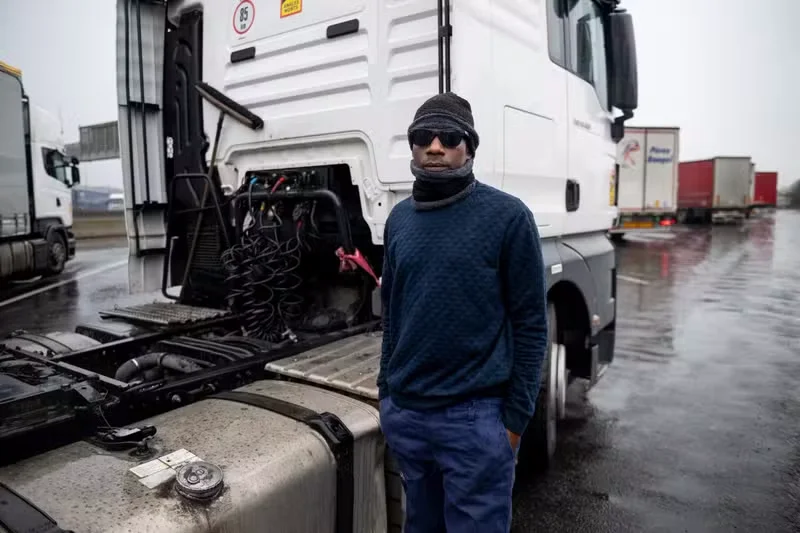Zim truck drivers suffer traumatic experiences in Europe; three stranded in Paris

TRUCK-DRIVER: Jonas Brighton
PARIS: In the pouring rain, some 40 kilometres north of Paris, at the Survilliers freeway service area, Brighton Jonasi didn’t dare get out of his truck on Friday, January 31, and couldn’t even start it.
Two days earlier, on the evening of January 29 and again on the night of January 30, four men in a van came to forcefully take the card he used to pay for gas, the battery switch that enabled him to start the vehicle and the trailer he was transporting.
They told him they worked for his Slovakian company, Global Transporte, a subcontractor of the German Hegelmann group. Over the last few days, a dozen other drivers of Zimbabwean origin have had the same traumatic experience in Europe, and three of them are still stranded at French freeway service areas.
What appears to be retaliation follows the start of a strike by these employees. On the weekend of January 25 and 26, they stopped their trucks, demanding improved working conditions and health insurance.
Having come to Europe with the promise of a salary of €1,500 a month, “or even 2,200 including bonuses,” according to Jonasi, most of them have only received between €600 and €700 since October.
An ‘independent entity’
In defiance of European regulations, he confessed to not having observed the mandatory 45-hour break every fortnight, nor to having slept anywhere other than on the truck’s modest bench seat. And this has been the case since October 24. He was unable to name a day on which he had not driven. This means he earns an average of €23 a day.
“These drivers were recruited in 2023 and arrived in Europe last year,” explained Edwin Atema, a former Dutch truck driver and head of the drivers’ advocacy group Road Transport Due Diligence.
“Working every day for this income is not what was agreed. At first, the company started by telling them that there were deductions from their wages because of the cost of work documents.”
“Global Transporte acts in compliance with all applicable legal regulations and works in close collaboration with the relevant institutions,” Hegelmann, a transport group with 10,000 employees and 5,000 trucks, replied to Le Monde about this subcontractor, an “independent entity.” “Global Transporte hires employees from different countries and ensures that working conditions are comfortable and fair for all team members, whatever their origin or ethnic background.”
Feeling of fear

Transnational goods transport is often carried out by trucks registered in Eastern Europe, driven by immigrant workers from outside Europe (Central Asia, India, Africa), in appalling working conditions.
“Hegelmann is one of the experts in social dumping; they have subsidiaries in every country, where they make non-Europeans work in slave-like conditions. The company was reported to the German public prosecutor’s office in 2015 for unfair competition. Seven or eight years later, we learned that the case had been dismissed,” recalled Roberto Parillo, a Belgian trade unionist and president of the European Transport Workers’ Federation between 1997 and 2024.
“There have been clear European rules on working conditions since 2020, but the problem is that they are not respected, because there are no checks. As for foreign drivers, they don’t know what they’re signing and are sometimes intimidated into doing so without complaining.”
The experience of another compatriot from Zimbabwe earlier this week added to the fear of other drivers.
He had asked the German police for help, refusing to let strangers take his goods. Shortly after leaving the police station, the kidnappers reappeared and took control of the vehicle, taking it with them.
They told him they were going to “send him back to Zimbabwe” and that they “controlled the Czech and Slovak police,” explained the man in a video published by Atema.
He managed to warn the police again, and the truck was stopped 60 kilometres further on. He is now safe in a hotel. “We are waiting for a decision from the German prosecutor,” added Atema.
Jonasi had a less successful experience with the French police. After warning the authorities that some men wanted to steal his truck on Wednesday evening, he went to a police station but was followed by a van, which fled when the men in it realized that police officers were approaching them.
Back in the parking lot, Jonasi had the unpleasant surprise of seeing the van reappear at night. Terrorized, wedged inside his truck, he could do nothing: “While they were forcibly pulling with a rope to remove the trailer, I called the French police four times and four times they told me they were coming. They never came.”
Regular assaults
After being alerted, the transport sections of the CGT and CFDT unions quickly came to the aid of the isolated workers.
“I called the law enforcement agencies as soon as I got the information and, this Friday evening, we’re going to talk to the prefect and Transport Ministry,” explained Khalid Ezzarhouni, from CGT Transports. “These are not acceptable situations in 2025, this is human trafficking.”
“I’m not surprised by this situation,” added Patrick Blaise, general secretary of the CFDT’s road union. “This comes amid a context where all drivers, whether European or not, are regularly assaulted and robbed in parking areas.
“From Saturday, we’ll be taking care of the three drivers in France, replacing the battery switch on the one who no longer has one, and supplying them with food.”
In addition to keeping drivers safe and waiting for a police or judicial response to the case, Atema has also begun contacting Hegelmann’s major customers.
“The distributors and retailers who work with them need to know what’s going on. They’re taking the case very seriously.
—ZimGazzette







